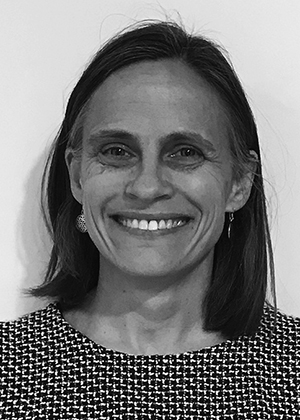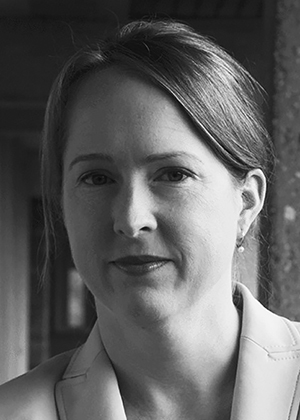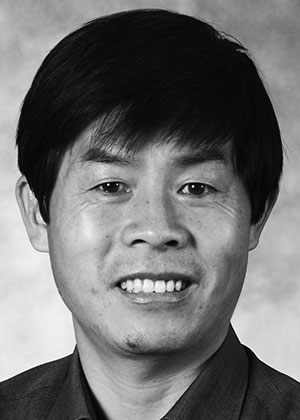Citation for Penelope L. King

Dr. Penelope King received her Ph.D. in 1999 from Arizona State University and her B.Sc. in 1993 from the Australian National University (ANU). She is currently a professor at ANU. King is one of the most well-rounded Earth scientists of her time. She has made important contributions to the fields of igneous petrology, hydrothermal geochemistry, microanalysis, Martian geochemistry, and cosmochemistry.
In her early days, she laid out how A-type granites formed. She then transitioned her research into understanding volatile solubility in magmas and various minerals. She pioneered various spectroscopic and microanalytical methods to make these challenging measurements. This expertise launched a new chapter of her career to research the composition and evolution of fluids on Mars and other planetary bodies. Most recently, King completed a series of works on the role of gas–solid reactions in controlling the behavior of metals in magmatic and hydrothermal environments. This work may provide the long-sought-after solution to how copper is ultimately precipitated in many ore deposits. The evolution of her own research exemplifies the evolution of a highly creative scientist who brings together theory, modeling, field observations, experiments, and deep geologic intuition to tackle some of the most challenging problems in the Earth sciences.
In addition to her academic accomplishments, King has been a selfless contributor to the advancement of science. She has served on and chaired various committees of AGU, the Geochemical Society, the Mineralogical Society of America, and the Mineralogical Association of Canada. She served on AGU’s Education Task Force in 2016 as well as leading a number of education and curricula committees in Australia and Canada. She contributed commentaries in Elements magazine on how to succeed in science. At her home in ANU, she championed new ways of recruiting and retaining diversity. For her efforts, she won the ANU Vice-Chancellor’s Clare Burton Award for Excellence in Equity and Diversity for her selfless contributions to the university.
In summary, as a highly creative scientist and a selfless contributor to the scientific community and the public, King is the ideal role model for the next generation of scientists.
—Cin-Ty Lee, Rice University, Houston, Texas
Response
I am thrilled and honored to receive AGU’s medal recognizing Joanne Simpson, who was an intellectual giant in atmospheric sciences. It also means a lot to me that Cin-Ty Lee—a scientist whose work I admire—spent nontrivial time putting together a nomination package. Thank you also to those who wrote letters and the volunteers on AGU awards committees.
I’ve been blessed throughout my career to work with many extraordinary mentors and an exceptional group of inspiring students. I’m especially grateful for unflagging support from my parents, Rod and Lib; my husband, David Lescinsky; and my children, Nettie and Katy. I’d also like to acknowledge wonderful mentorship and collegiality from Bruce Chappell, Allan White, John Holloway, Rick Hervig, Dick Henley, Darby Dyar, Roberta Rudnick, Charlotte Allen, Wayne Nesbitt, Currie Palmer, Marc Norman, Vickie Bennett, and Lesley Wyborn.
I was delighted when the citation characterized me as “highly creative” and a “well-rounded Earth scientist.” Over the years, many colleagues have kindly suggested that I should specialize on one topic to be more successful. I’ve listened, agreed, and then gone to work on something new again! This award tells me that the windy path that I have taken might be going in the right direction!
It troubles me somewhat that being a creative and well-rounded scientist is noteworthy. Universities are places of learning where creativity is valued. It is widely acknowledged that creative, broad, and diverse approaches are essential for solving wicked problems like climate change. Yet creative and diverse science can be hard to comprehend. Neatly defined “stories” are favored by grant reviewers, journal editors, media agencies, our colleagues, and, commonly, even you and me! Additionally, we can easily identify successful people who have developed a single field or who work on topics similar to those we work on ourselves. I sometimes wonder how Leonardo da Vinci or Galileo would have coped in the 21st century—would they have been employed, received grants, published papers, given talks, or been relegated to the margins?
I am encouraged by AGU’s emphasis on diversity in terms of personal characteristics and its recognition of diverse science through this award honoring Joanne Simpson. I plan to continue working hard to embrace and support diversity in our community and our science. Although the path may continue to be windy, I feel that the challenge is worthwhile as we aim to solve some of the most perplexing problems in the Earth sciences.
—Penelope L. King, Research School of Earth Sciences, Australian National University, Canberra
Citation for Ann Pearson

With sustained contributions of one cutting-edge study following after another, Dr. Ann Pearson has uncovered the origins of biomarkers and refined how we use them to study past oceans and ancient climate. Her often startling and always incisive findings are grounded in sharp perceptions and iron-clad reasoning. In less than 2 decades since earning her Ph.D., Dr. Ann Pearson has revolutionized biomarker studies.
Dr. Pearson achieved prominence in the paleoceanography and marine chemistry communities right out of the gate. She pioneered analyses of carbon-14 (14C) ages of individual organic compounds as part of her graduate research with John Hayes and Tim Eglinton. Their work revealed a stunning spread of 14C ages among marine biomarkers that reflects an interwoven timeline of biogeochemical processes and transformed the study of organic molecules in natural environments. Dr. Pearson pioneered the use of genetic tools and phylogenetic analyses to evaluate the origins of biomarkers, with findings that more often than not upended conventional interpretations and long-held beliefs. She has continued to innovate analytically, including new ways to measure stable isotopes in tiny organic particles, pigments, and large proteins.
Archaeal lipids can reveal past marine temperatures, information that is critical to paleoceanography and paleoclimate studies. While the origins of the lipid patterns that comprise this signal are hotly debated, Dr. Pearson used her novel isotopic tools to establish the source organisms are chemoautotrophic and fueled by ammonia oxidation. She has used innovative experimental studies and field samples to show the distributions of lipids used for temperature estimates are sensitive to cell growth rates and tied to the availability of nutrients in the water column.
Dr. Pearson’s impact in science is matched by her generous efforts as a mentor of young scholars and her wide reach as a collaborator. Her former students and postdocs have gone on to make their own marks in institutions around the world. Her service to the community includes taking the time to pen white papers and review articles that guide the field and doing the heavy lifting to organize international meetings, such as chairing the Organic Geochemistry Gordon Research Conference.
Dr. Pearson’s scientific contributions are creative and analytically fearless in equal measure. I suspect this would have appealed to Dr. Joanne Simpson, whose own pioneering career demonstrated both delight and determination within her journey of discovery. Congratulations, Ann, for this well-deserved honor, and I can’t wait to see where your scientific adventures take us next.
—Katherine Freeman, Pennsylvania State University, University Park
Response
It is an honor and a pleasure to accept the AGU Joanne Simpson Medal for mid-career scientists. Thank you, Kate, for the generous citation and for being such a wonderful colleague and role model, and thank you to the others who supported my nomination and to our entire community for permitting me the privilege of a life spent in science. Success in research truly takes a village, and I have had the joy to work throughout my career with an extraordinary group of mentors, peers, colleagues, postdocs, and students. I receive this award not for myself, but for all the work we, as a network of like-minded individuals, have done together, and I hope more than anything else to continue to have a positive influence on the younger generation.
Seemingly trivial events, coincidences that turned out to have outsized impacts after the fact, and sheer luck all are part of my personal journey to this moment. My undergraduate research project with Professor Norman Craig introduced me to preparative chromatography. I was 18 years old and never imagined the extent to which those skills would determine the rest of my life—thank you, Norm. I randomly met a student from an oceanography program during a summer internship at Bell Labs, and she inspired me to switch from physical chemistry to oceanography—thank you, Stace Beaulieu. An article in Applied and Environmental Microbiology on polychlorinated biphenyls (PCBs) that my graduate school classmate Liz Kujawinski was reading just happened to be printed next to one on lipids of archaea…back in the old days of bound journals! Liz, for that and everything else along the way, a thousand thank-yous. I cannot possibly thank all the other important people in my scientific journey by name, as there are so many. Instead, I wish to remember the two we lost far too soon, John Hayes and Katrina Edwards, and to thank my family and my wife, Brook, for their unending support.
Finally, on the attribute of being fearless, I must disagree. In the words of Georgia O’Keefe, “I’ve been absolutely terrified every moment of my life—and I’ve never let it keep me from doing a single thing I wanted to do.” Curiosity wins in the end.
—Ann Pearson, Harvard University, Cambridge, Mass.
Citation for Fuqing Zhang

Dr. Fuqing Zhang (1970–2019) was a university distinguished professor in the Department of Meteorology and Atmospheric Science and the Department of Statistics at the Pennsylvania State University. He received his doctoral degree in 2000 from North Carolina State University and was elected a Fellow of AGU in 2018. He was the founding director of the Penn State Center for Advanced Data Assimilation and Predictability Techniques.
He made major contributions to the fundamental understanding of atmospheric dynamics and predictability, and he revolutionized the analysis and prediction of hurricanes and severe storms through incorporating high-resolution radar and satellite observations into cloud-resolving state-of-the-art numerical weather prediction models with advanced ensemble-based data assimilation methodologies that have been widely adopted by the National Oceanic and Atmospheric Administration (NOAA) and other agencies and researchers around the world. He also demonstrated exceptional leadership, provided outstanding service to science and society, and provided great mentorship to junior scientists. He gave over 300 keynote or invited talks to various institutions and meetings. He served as principal investigator (PI)/co-PI for more than 50 federally funded research projects totaling well over $10 million.
He also served on numerous expert panels or advisory boards for the National Science Foundation, NASA, NOAA, the Office of Naval Research, the American Meteorological Society (AMS), and the National Academies. He organized numerous national and international conferences and workshops. He served as editor of several professional journals and was one of the three editors for the newest edition of the Encyclopedia of Atmospheric Sciences (six volumes, a total of 2,998 pages). He received numerous awards for his research and service, as exemplified by two major research awards from AMS: the 2009 Clarence Leroy Meisinger Award “for outstanding contributions to mesoscale dynamics, predictability and ensemble data assimilation” and the 2015 Banner I. Miller Award “for valuable insights into incorporating real-time airborne Doppler radar measurements via ensemble data assimilation, leading to improvements in forecasts of tropical cyclone track and intensity.”
He also held various visiting appointments at various prestigious institutions, including Peking University, Nanjing University, the National Center for Atmospheric Research, the Naval Research Laboratory, NOAA’s Hurricane Research Division, and École Normale Supérieure in France. More recently, he was selected as the 2015 Rossby Fellow of the International Meteorological Institute (Sweden), a Houghton Lecturer at the Massachusetts Institute of Technology during his 2015 fall sabbatical, the Nordenskjöld Lecturer at the University of Gothenburg in 2016, the 2017 Burgers Keynote Lecturer at the University of Maryland, and the Chair to lead the 2018 Gothenburg Chair Programme for Advanced Studies (Sweden). He was the recipient of the Penn State 2018 Faculty Scholar Medal in physical sciences. He passed away suddenly on 19 July 2019. The 2019 Joanne Simpson Medal serves a great purpose in honoring and remembering Dr. Fuqing Zhang.
—Renyi Zhang, Texas A&M University, College Station
Citation:
(2020), King, Pearson, and Zhang receive 2019 Joanne Simpson Medals for Mid-Career Scientists, Eos, 101, https://doi.org/10.1029/2020EO138686. Published on 27 January 2020.
Text © 2020. AGU. CC BY-NC-ND 3.0
Except where otherwise noted, images are subject to copyright. Any reuse without express permission from the copyright owner is prohibited.
